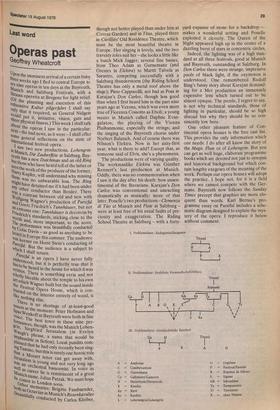Last word
Operas past
Geoffrey Wheatcroft UPon the imminent arrival of a certain baby three weeks ago I fled to central Europe to see nine operas in ten days at the Bayreuth, Munich and Salzburg Festivals, with a Strauss operetta at Bregenz for light relief. (Of the planning and execution of this exhaustive Kultur pilgerfahrt I shall say cialY that it required, as General Nidgett would put it, initiative, vision, guts and Sheer physical fitness.) This week I shall talk about the operas I saw in the particular: next— the bad news, as it were — I shall offer s.°tIle general reflections on the state of atternational festival opera. I saw two new productions, Lohengrin LuMunich, Die Zauberflote at Salzburg. Bayteuth has a new Dutchman and an old Ring sheuetn the tliose who have heard tell of the latter or work of the producer of the former, IltharrY Kupfer, will understand why missing 'era was no unbearable loss. The Ring Might have detained me if it had been under any other conductor than Boulez. There a contrast between old and new with Wolfgang Wagner's production of Parsifal arid Goetz Friedrich's Tannhliuser, but not an extreme one: Tannhiiuser is decorous by rriedrich's standards, sticking close to the 1,1"1,ords and, more important, to the score. ie Performance was beautifully conducted Y 1,3' Cohn Davis — as good as anything to be LeardEuro--this summer. The audience pas keener on Horst Stein's conducting of rsifai. But the audience is a subject to Which I shall return.
understood; is an opera I have never fully
has but it is perfectly true that it as to be heard in the house for which it was written. There is something eerie and not Wholly likeable about the temple to his own art whi,
,., en Wagner built but the sound inside
rthe restival Opera House, which is contleted on the interior entirely of wood, is ke nothing else. , There is no shortage of at-least-good ?I-tors at the moment: Peter Hofmann and if1:?sWenkoff at Bayreuth were both in fine ooice. The best tenor in these nine pergrrillanees, though, was the Munich Lohenwn, Siegfried Jerusalem (in Evelyn augh's phrase, a name that would be implausible in fiction). Local pundits complained that he had only recently been singttnhg Taming, but this is surely one heroic role L7,_at a Mozart tenor can get away with. usalem is young and not very long ago 7-s. an orchestral bassoonist. In voice as Well as career he is reminiscent of a great "lartieh
1„,. Fomes to London soon.
name,
,,,. 1„,. Fomes to London soon.
name,
,,,.
Julius Patzak. We must hope bou,ther memories: Brigitte Fassbaender, „ell' as Octavian in Munich's Rosenkavalier atitifully conducted by Carlos Kleiber, though not better played than under him at Covent Garden) and in Titus, played there in Cuvillits' Old Residence Theatre, which must be the most beautiful theatre in Europe. Her singing is lovely, and the two travesty roles suit her — she looks a little like a butch Mick Jagger; several fine basses, from Theo Adam as Gurnerrianz (and Orestes in Elektra) to Martti Talvela as Sarastro, competing successfully with a Salzburg thunderstorm (the Riding School Theatre has only a metal roof above the stage); Piero Cappuccilli, not bad as Pow. in Karajan's Don Carlos, though less good than when I first heard him in the part nine years ago at Verona, which was even more true of Fiorenza Cossotto as Eboli; a young mezzo in Munich called Daphne Evangalatos; the playing of the Vienna Pluibanmonic, especially the strings; and the singing of the Bayreuth chorus under Norbert Balatsch. And of course there was Nilsson's Elektra. Now in her sixty-first year, what is there to add? Except that, as someone said of Elvis, she's a phenomena. The productions were of varying quality. The workmanlike Elektra was Ganther Rennert's last production at Munich. Oddly, there was no commemoration when I saw it the day after his death: how unsentimental of the Bavarians. Karajan's Don Carlos was conventional and unexciting dramatically as musically: more of that later. Ponelle's two productions —Ciemenza di Tito at Munich and Flute at Salzburg — were at least free of his usual faults of preciosity and exaggeration. The Riding School Theatre at Salzburg — with a forty yard expanse of stone for a backdrop — makes a wonderful setting and Ponelle exploited it cleverly. The Queen of the Night appeared high up in the centre of a dazzling burst of stars in concentric circles. Indeed, the lighting was of a high standard at all three festivals, good at Munich and Bayreuth, outstanding at Salzburg. In Don Carlos there were strange, impressive pools of black light, if the oxymoron is understood. One remembered Rudolf Bing's funny story about Karaj an demanding for a Met production an immensely expensive lens which turned out to be almost opaque. The puzzle, I regret to say, is not why technical standards, those of lighting in particular, should be so high abroad but why they should be so consistently low here. One other pleasant feature of Continental opera houses is the free cast list. This provides the only information which one needs: I do after all know the story of the Magic Flute or of Lohengrin. But you can get as well huge, elaborate programme books which are devoted not just to synopsis and historical background but which contain lengthy exegeses of the meaning of the work. Perhaps our opera houses will adopt the practice. I hope not, for it is a field where we cannot compete with the Germans. Bayreuth now follows the Sunday Times precept that graphics are more eloquent than words. Karl Bertau's programme essay on Parsifal includes a schematic diagram designed to explain the mystery of the opera. I reproduce it below without comment.


































 Previous page
Previous page